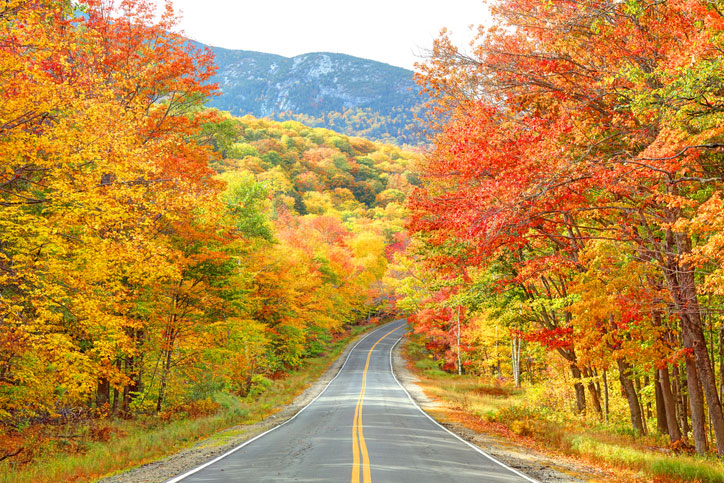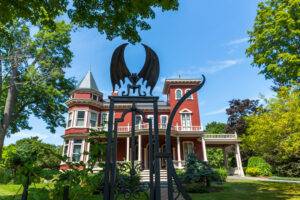Written by Alex Dorian

You have to wonder what Henry David Thoreau was feeling when he wrote this passage in The Maine Woods. Outrage? Befuddlement? You’d marvel at a 50-foot pine swaying in the wind, but when was the last time you put a box of matches on a pedestal? Such juxtaposition could only be found in a state like Maine.
Yet there’s that old cliché of the writer escaping into the solitude of wilderness to indulge in their craft. Stephen King’s character Jack Torrance in “The Shining” thought that’d give him the space to finish his book. Didn’t quite pan out.
Becoming a writer in Maine doesn’t have to involve escaping to The Forks and filling a notebook along the Kennebec River. Portland has an artsy feel to it – an important feature for any young writer. Painters, videographers, and other artists may inspire you to approach your work in ways you’ve never imagined.
When you get to a place where you realize a creative writing degree could be the only thing between you and the writing career you’ve always wanted, the decision from there is simply what degree and from which school. A bachelor’s in English with a creative writing emphasis perhaps, or a master’s to stack on your existing bachelor’s … or maybe a BFA (Bachelor or Fine Arts) or MFA (Master of Fine Arts) program from a school with a strong artist’s presence? Here in Maine, you’ll find them all.
Creative Writing Classes, Courses, and Workshops in Maine Can Prepare You for a Creative Writing Degree
You don’t have to move to New York City to find a thriving community of writers. If Thoreau can find inspiration in the deep woods of The Pine Tree State, surely you can find something worth writing about by taking writing classes in Portland and surrounding communities, and workshopping with other brilliant up-and-coming writers like yourself.
The Master of Horror is Also a Master of Giving Useful Writing Advice
 Whether you’re a fan of his or not, you can’t think of Maine’s writing scene and ignore Stephen King. He’s published over 64 books, many of which take place in a strange universe that could only come from his mind, though perhaps born from his surroundings.
Whether you’re a fan of his or not, you can’t think of Maine’s writing scene and ignore Stephen King. He’s published over 64 books, many of which take place in a strange universe that could only come from his mind, though perhaps born from his surroundings.
Sure, maybe you’re not a fan of The Dark Tower series or Pet Sematary, but you don’t have to be. King still offers some sage advice to writers honing the craft. It may be the kind of actionable critique of your own work that you need to become a more polished writer, but for some of the best general advice you’ll find anywhere, look no further than this excerpt from King’s On Writing:
“Write with the door closed, rewrite with the door open. Your stuff starts out being just for you, in other words, but then it goes out. Once you know what the story is and get it right – as right as you can, anyway – it belongs to anyone who wants to read it. Or criticize it.”
It’s perfectly fine to write for yourself, but let’s not kid around: You want others to experience it. Take their experiences into consideration. They can help you correct your story in a way you wouldn’t be able to without them.
The Maine Writers & Publishers Alliance (MWPA) is comprised of writers, editors, publishers, booksellers, and literary professionals in every stage of the process. With more than 1,500 members, the MWPA’s chief purpose is to increase awareness of Maine writers. You’ll find opportunities for critique, meetings with literary agents, and discussions with publishers. It’s a great resource both as an artist and a professional.
Whether you’re a published author or just starting out, the South Portland Public Library Writers’ Group is a fantastic resource. Need some critique on a short story? Want feedback on an article you wrote about current events? Searching for reactions to your collection of poems? This community will hear it all.
A community such as the one at South Portland Public Library can also work a very important muscle for you: the ability to critique your colleague’s work. Doing so allows you to better comprehend why something does or doesn’t work; whether a story suspends your disbelief who drops it.
Over time, you’ll be able to step back and take a look at your own work. It’s easy to think we’ve written a masterpiece when we lack a critical eye, and nothing delivers that ability in the service of becoming a stronger writer than a formal creative writing degree program. A bachelor’s or master’s degree in creative writing, whether a fine arts degree or a degree in English with an emphasis in creative writing, will help build the strong both the neural and social connections every writer needs when honing their craft.
Writing Colleges in Maine Offering Bachelor’s and Master’s Degrees in Creative Writing Provide a Path to Becoming a Writer
You’ll develop relationships that last a lifetime while earning a degree in creative writing – an important resource for anyone trying to make it as a writer in any capacity. Decades after you leave the campus, you’ll still go to the people you graduated with for opinions on your work.
Even if a program isn’t exclusive, you’ll still connect with the right kind of people and professors. It’s a hard thing to describe – something will just click. You’ll think “we understand each other.” Through that understanding, you’ll discover how to help each other, especially after taking several courses together over a number of years.
Bachelor of Fine Arts (BFA) and Other Bachelor’s Degrees in Creative Writing in Maine
Colby College
DEPARTMENT OF ENGLISH AND CREATIVE WRITING
Accreditation: NECHE
Degree: Bachelor – BA
Private School

- English-Creative Writing concentration
University of Maine at Farmington
Accreditation: NECHE
Degree: Bachelor – BFA
Public School

- Creative Writing
Master of Fine Arts (MFA) and Other Master’s Degrees in Creative Writing in Maine
University of Southern Maine
COLLEGE OF ARTS, HUMANITIES, AND SOCIAL SCIENCES
Accreditation: NECHE
Degree: Master – MFA
Public School

- Creative Writing



